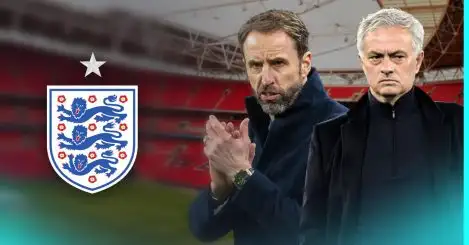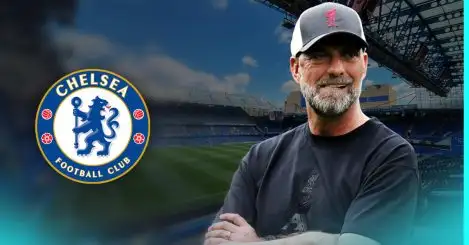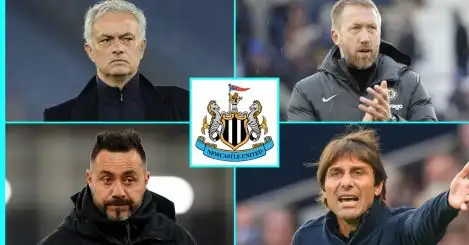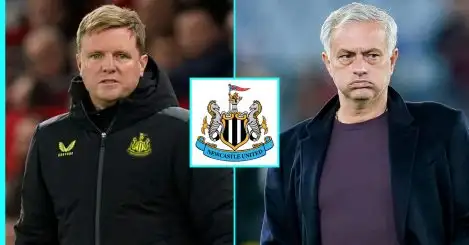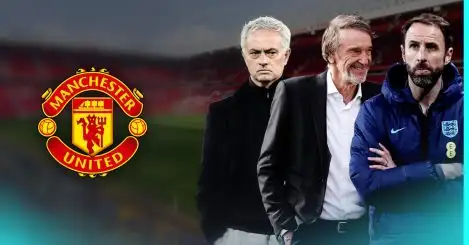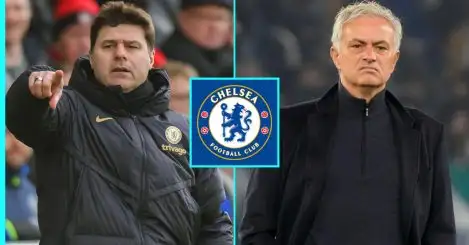Mourinho tops Premier League winners and losers
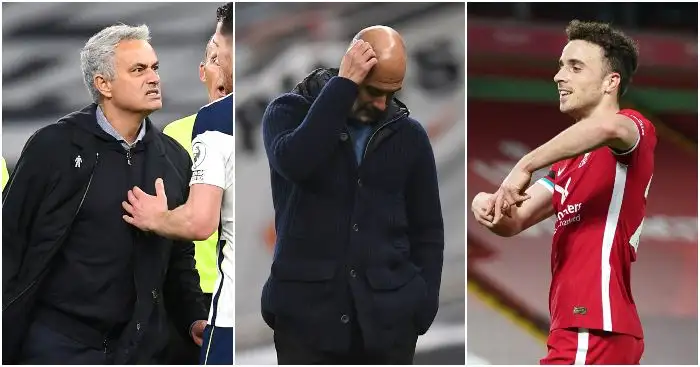
Winners
Jose Mourinho, answering one of the questions
The second year of Jose Mourinho’s Tottenham began with the type of Mourinho performance you can hang in a museum for him to stare at longingly. Two shots on target and two goals? Check. Efficient forays into the opposition half while soaking up pressure? Check. His great rival swatted aside to increase the cries of crisis? Check again.
This wasn’t lucky, whatever the raw numbers of the game might suggest. Manchester City have been profligate for so long that Mourinho backed his defenders to limit them to shots from low-percentage areas. He deliberately avoided attacking City too regularly because then the surprise counter loses its mojo. But when Tottenham did push on and overload the final third, they caused problems every time.
This, roughly, is Mourinho’s attacking strategy at Tottenham. The number of shots, chances created and touches in the opposition box have all dropped significantly from the last year of Pochettino to the first year of Mourinho, but Tottenham have scored comfortably more goals. They are taking their shots closer to goal and – as logic might suggest – scoring with a higher proportion.
This run of fixtures promised to offer the definitive assessment of Tottenham’s credentials this season. For all the positivity of sitting second in the league before Saturday, Spurs had only faced one of last season’s top eight. After City come Chelsea, Arsenal, Liverpool and Leicester before Christmas and Wolves on Boxing Day.
But Saturday proved that Tottenham supporters have little reason to fear such opponents. At Manchester United, Mourinho’s big-game record suffered a hit thanks to a disastrous away record. Address that at Tottenham and the sky is suddenly the limit.
READ MORE: ‘Yesterday’s man’ Mourinho perfect for Tottenham’s title tilt
Diogo Jota
An astounding impact. The benefit of buying players from within your own league (usually offset by a higher transfer fee) is that there’s a fair chance they won’t need long to settle in, but not even Liverpool predicted that Jota would become so vital so quickly. In his five starts since his first against Aston Villa (a match that now seems like a bizarre aberration rather than a sign of future toils), Jota has six goals.
One theory is that Jota has benefitted from being Liverpool’s surprise forward. Over the last three years Jurgen Klopp’s front three has been set in stone, with those on the fringes (Divock Origi, Xherdan Shaqiri, Takumi Minamino) unable to ever establish themselves beyond fleeting substitute minutes. That didn’t mean that Liverpool’s forwards were easy to stop, but opponents did at least roughly know what to expect. Jota changes all that and has reaped the rewards.
The second theory is that Jota is playing a slightly different role for Liverpool than Wolves, staying higher up the pitch rather than dropping deep to pick the ball up and running at defenders. He is completing fewer dribbles, creating fewer chances and taking more shots than last season. Without Raul Jimenez as the focal-point centre-forward, Jota is able to play in a non-deferential attacking role.
The third theory, and bear with me here, is that Jota is an excellent young forward capable of playing a variety of roles who has been given a huge confidence boost by Liverpool’s determination to sign him. I know, it’s a piping hot take.
Open play PL home goals this season:
Diogo Jota 4
Man City 2
Man Utd 1— Duncan Alexander (@oilysailor) November 22, 2020
Brighton, winning a different way
Football is a baffling, stupid sport at times. All season, Brighton have promised much and delivered precious little. They have regularly outshot their opponents but been undone by inefficient finishing and lapses in defensive concentration that have cost them dear. With Liverpool, Leicester City and Southampton to come in their next three games, Graham Potter was desperate for that record to change.
And so Brighton went to Villa Park, managed less than half as many shots as their opponents and won 2-1 thanks to two superb finishes from chances far more difficult than they have missed this season. Solly March’s was a thing of absolute beauty.
Potter will also appreciate the away points, given Brighton’s perennial issue since promotion. Before this season, they had won nine of their 57 away league games in the Premier League. Seven points from five away games in 2020/21 represents a significant improvement.
Tammy Abraham, taking his chance
Abraham knows that he faces a fight for his first-team place at Chelsea. He knows that will have a knock-on effect for his future career and more immediately his chances of making England’s Euro 2021 squad next summer. With Kai Havertz and Christian Pulisic still searching for full fitness, Abraham is acutely aware that Timo Werner can move centrally to accommodate one or both of them in the team.
But all Abraham can do is seize his opportunity and right now he is undroppable. His expertly taken finish against Newcastle was in stark contrast to Werner’s snatched shot in the first half. It took Abraham to nine goals and assists in his last seven Chelsea starts. The added competition for places has re-energised a striker who scored only three times in the league last season after the turn of the year.
Chelsea
Our early winners.
Pierre-Emile Hojbjerg
Last season, the Tottenham player who won possession the most times in the league was Moussa Sissoko with 204. That placed Sissoko 28th in the division. The player at the top of the list, 13 clear of second place? Hojbjerg.
Sometimes scouting and recruitment is an easy business. Mourinho wanted a central midfielder who delighted in biting into tackles, breaking up play and recycling possession. Tottenham effectively looked at last season’s list and picked the top name (who happened to be very keen on leaving Southampton). Now Tottenham have the player who ranks joint-first for tackles won and joint-third for possessions won and their midfield has that missing bite. Easy game.
Liverpool’s defence
One surefire sign of a healthy football club is when you take out one of the key components and the rest are able to seamlessly rally round and cover for their loss. If it’s a centre-forward, the deputy hits the ground running or attacking midfielders chip in. If it’s a creative influence, the manager works on an alternative attacking strategy. If it’s a central defender, every other part of the team steps up their game to better protect the defence.
There will be times when Liverpool miss Virgil van Dijk because he is the world’s best centre-back. But that doesn’t make the statistic any less fascinating: In Liverpool’s seven competitive matches this season with Van Dijk starting, they conceded 15 goals. In the seven competitive matches since he got injured, just three.
Go and read 16 Conclusions if you haven’t already.
Sebastien Haller
The first goal of his league career from outside the box, in game no. 190. Should have celebrated it fella.
Losers
Manchester City’s normal
It is as if even non-casual observers have failed to recognise how long Manchester City’s slump has lasted, or perhaps were hardwired during their two years of magnificence to assume that they are one moment away from everything clicking into place. Before Saturday’s loss at Tottenham, the home team were longer than 3/1 to beat a team below them in the league, beset by absences and in worse form.
There’s a theory that Manchester City’s issues would be solved – or at least effectively masked – by a top-class centre forward who could keep himself fit, and there’s clearly something in it. Sergio Aguero has started 20 of City’s 46 league games since the start of last season. City again registered more than 20 shots on Saturday and again failed to score more than once. Their last six league matches: 95 shots, 210 touches in the opposition box, five goals. That’s extraordinary, really.
So it says plenty about City’s current guise that finishing isn’t even their biggest problem. In their pomp, they pressed and hounded their opponents in packs, forcing turnovers high up the pitch that often created space for Leroy Sane to get close to the byline and pull the ball back for Raheem Sterling or Aguero to finish from close range. Not only has Sane left to make the lightning-fast transitions look more sluggish, the pressing has all-but disappeared. The only thing worse than not pressing at all is pressing as individual components that are extremely easy to pass around. Stick Tottenham’s opening goal on loop for all the evidence you need.
Those flaws – profligacy, incoherent pressing, defensive flaws – have combined to remove the psychological advantage City once held over opponents. Whole months passed by in 2017/18 and 2018/19 when opposition managers would barely bother to attack City, instead content to sit deep and hope for a 0-0 draw but be reasonably pleased if they only lost by a single goal. Now the opposite: It is City who appear haunted, waiting for the next moment of adversity that plunges everyone into panic mode.
But why would you fear that starting XI? Riyad Mahrez and Bernardo Silva’s form has fallen off a cliff, Ferran Torres is still young and raw, Gabriel Jesus’ finishing is haphazard, Rodri cannot protect a defence on his own and even Kevin de Bruyne has tailed off this season. If that’s more to do with him being so easily identifiable as their greatest weapon than any fault on his part, that doesn’t help City.
One question that has been answered this week is Pep Guardiola’s future, a two-year contract extension signed. But that doesn’t actually solve any problem. Guardiola is now tasked with either overseeing a squad overhaul (Aguero, Walker, Fernandinho, Mahrez, Gundogan and De Bruyne will all be 30 or above by the start of next season) or re-establishing the buy-in from the existing players that looked so concrete two years ago but has clearly been eroded. It will not be easy.
The three Newcastle United myths
“Well they are never happy, are they? They want to win the Champions League but they’re not in it unfortunately” – Mark Lawrenson, November 7.
Well, yes and no. Of course Newcastle United fans would like to win the Champions League. Every supporter of every club wants their team to be as successful as it can be. But that’s not the point (and it’s not Lawrenson’s point either). He is insinuating (as many other pundits have) that there is an unhelpful entitlement amongst Newcastle United supporters, a lack of gratitude for their current situation. You’re 14th in the Premier League, guys – what’s the worry?
The worry is that they support a football team that barely even tries to attack. After 84 minutes against Chelsea on Saturday, with their team 2-0 down but with a throw-in close to Chelsea’s goalline, Newcastle played the ball back down the line, then into central midfield and then to their goalkeeper. Karl Darlow launched the ball upfield and Chelsea won back possession. That’s the worry.
Newcastle rank 20th in the league for shots per game. Newcastle rank 20th in the league for shots on target per game. Newcastle rank 20th in the league for touches in the opposition box per game. Newcastle rank 20th in the league for passes in the final third per game. Newcastle rank… 19th in the league for successful passes per game. Huzzah!
“Newcastle don’t have the personnel to play any other way.”
Nonsense. They have Callum Wilson, a proven No. 9 who will score when serviced effectively and probably still score a few when he isn’t. They have Miguel Almiron and Allan Saint-Maximin, two exciting wide attackers whose confidence has been shorn to the point of disillusionment (see the comments of Almiron’s agent this week for details). They have Ryan Fraser too, and a collection of capable midfield holders. They have Jamal Lewis, an excellent attacking left-back.
It is true that Newcastle don’t have a squad capable of making a sustainable challenge for a top-six place or one suited to playing all-out-attack football, but then both of those are straw-man arguments. They do have a squad that might offer more if they didn’t sit 40 yards from their own goal and hope that their goalkeeper produces consistent brilliance to keep them in matches.
“Erm, they played exactly like this under Rafael Benitez.”
They did indeed play very deep under Benitez against Big Six opponents, particularly away from home. Benitez got plenty of stick for one defeat against Manchester City in which Newcastle also barely bothered to try and attack. But here’s the thing: They didn’t always play that way.
Between January 1 and the end of 2018/19, when Benitez managed his last game, Newcastle ranked joint-sixth in the league for goals, seventh for chances created and ninth for shots and shots on target. Their five most regular attacking starters were Salomon Rondon, Ayoze Perez, Miguel Almiron, Christian Atsu and Matt Ritchie. Those options are not better than Bruce’s now, and were certainly less expensive.
But really, none of this matters. Because you do not get to tell football supporters how they should support their club, particularly those who have ploughed thousands of pounds and hours into it. There’s nothing wrong with wanting more than this (and it would be great if Bruce recognised that and was more adventurous). There’s nothing wrong with wanting your team to attack or even wondering what might happen if they didn’t sit so deep. There’s nothing wrong with wanting to be entertained by your football team. Anyone that tells you otherwise is wrong.
Sheffield United and an uncomfortable choice
They might not be there yet. They might never get there, and everyone at Bramall Lane will hope they don’t. But if this run continues, awkward looks will pass between supporters and between members of Chris Wilder’s squad. How long do we keep faith in this changing?
Nobody wants to think about sacking the architect of Sheffield United’s extraordinary rise. They will look for mitigating factors: the lack of home crowds, a tough fixture list, fine margins, the short season break, plain old bad luck. But Wilder’s side are now 12 league games without a win either side of the season break. His stock response has been to accuse the players of not working hard enough, but that is either a misdiagnosis or has failed to provoke a response.
You could make the argument (and many Sheffield United supporters have) that Wilder is immune to the usual sacking process. They would not be here without him, and their chances of finding a high-class replacement likely to address the slump are low. This is largely a Championship-level squad.
But then that theory has always felt a little more like idealism than realism. People said the same about Eddie Howe at Bournemouth, but club and manager both still felt it necessary to make a change after Bournemouth’s relegation. Perhaps if that split had come in February rather than May, Bournemouth might have stayed up.
But these are grim, difficult choices that nobody ever wanted to make. Much better would be to go to the Hawthorns next weekend and rediscover that grit and team spirit that carried them through adversity at every point it was required over the last four years.
Nicolas Pepe
It is not Pepe’s fault that Arsenal agreed to spend £72m on a player who some in France would have been fair value at half the price. It is not his fault that he was signed by one manager and subsequently inherited by another who probably wishes the money had been used elsewhere.
But it is his fault that he’s a bloody idiot. You can’t push for league starts and greater responsibility than Europa League minutes to then abdicate all responsibility with an act of dim petulance. Do not expect to see Pepe starting in the Premier League for a while.
The bottom three
I’m not saying there are some teams struggling for form, but we’re almost a quarter of the way through the season and Fulham are on course to stay up with 17 points.
Scott Parker
We aren’t there to see how Fulham’s players train in midweek. Perhaps Aleksandar Mitrovic and André-Frank Zambo Anguissa were tired after long international breaks and so needed to start the game on the bench. But that isn’t an excuse for Ruben Loftus-Cheek. The game turned on its head after the introduction of those three players, but too late for it to make a difference. Maybe Parker just got it completely wrong.
Fulham’s penalty record
“Ivan Cavaleiro is an exceptional penalty taker,” said Scott Parker after the game. “Last time I was in this situation I was angry but these things can happen.”
That’s all well and good, but it’s an exceptionally optimistic take about your third-choice penalty taker missing a crucial spot kick in the weeks following your first and second-choice takers also missing them. Might as well just save time and give the opposition a goal-kick.
Daniel Storey
